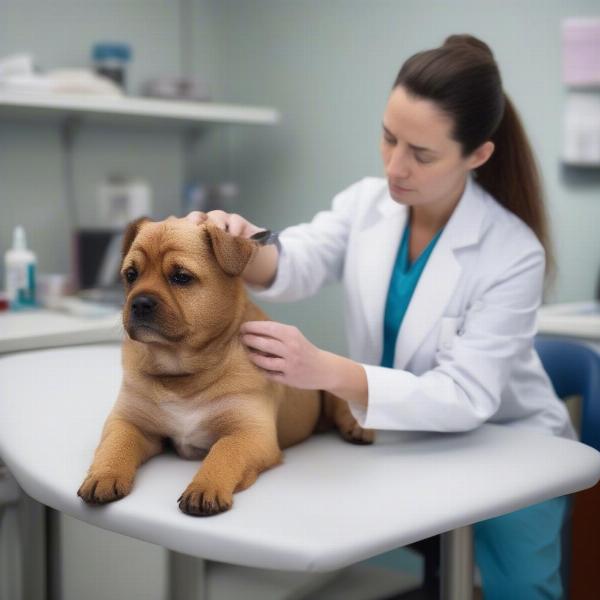Histiocytomas are common, benign skin tumors in dogs, often appearing as small, raised, red bumps. While typically harmless, a histiocytoma dog bleeding can be alarming for owners. This article provides comprehensive information about histiocytomas in dogs, focusing on why they might bleed and what you should do.
Histiocytomas are primarily found in young dogs, typically under three years old. They are composed of a specific type of immune cell called a Langerhans cell. These tumors often appear suddenly and can grow rapidly, sometimes leading to bleeding if they become irritated or traumatized. While a histiocytoma dog bleeding can be concerning, it’s important to remember that these tumors are usually self-limiting and often regress without treatment within a few months.
Understanding Histiocytomas in Dogs
Histiocytomas are often referred to as “button tumors” due to their raised, button-like appearance. They are most commonly found on the head, neck, ears, and limbs. These tumors are generally hairless and can range in color from pink to red. While they may occasionally bleed, they are rarely painful unless infected.
Why Do Histiocytomas Bleed?
Histiocytomas are delicate and located on the skin surface, making them susceptible to injury. Everyday activities like scratching, rubbing against objects, or even playful interactions with other dogs can cause the tumor to bleed. The thin skin covering the tumor can easily be broken, leading to minor bleeding.
What to Do If Your Dog’s Histiocytoma is Bleeding
If your dog’s histiocytoma is bleeding, the first step is to apply gentle pressure to the area with a clean cloth or gauze. This will help to stop the bleeding. Once the bleeding has stopped, clean the area with a mild antiseptic solution. If the bleeding is excessive or doesn’t stop within a few minutes, contact your veterinarian immediately.
When to Consult a Veterinarian
While most histiocytomas resolve on their own, it’s important to have any new skin growth examined by a veterinarian to confirm the diagnosis. This is particularly crucial if the growth is bleeding excessively, rapidly growing, or causing your dog discomfort. Your veterinarian may recommend a fine-needle aspiration or biopsy to confirm the diagnosis.
 Veterinarian Examining a Dog with a Histiocytoma
Veterinarian Examining a Dog with a Histiocytoma
Can Histiocytomas Be Prevented?
Unfortunately, there’s no known way to prevent histiocytomas in dogs. They are thought to be related to the immune system, and their development isn’t linked to any specific environmental factors or lifestyle choices. Regular veterinary checkups and being observant of any new skin growths on your dog are crucial for early detection and appropriate management.
Conclusion
A histiocytoma dog bleeding can be alarming, but understanding the nature of these tumors can ease your concerns. While most regress spontaneously, consulting your veterinarian is always recommended for proper diagnosis and to rule out other more serious conditions. With proper care and monitoring, you can ensure your dog’s comfort and well-being.
FAQ
- Are histiocytomas painful for dogs? Generally, histiocytomas are not painful unless they become irritated, infected, or ulcerated.
- How long does it take for a histiocytoma to go away? Most histiocytomas regress within 2-3 months without treatment.
- Can histiocytomas come back after they disappear? Recurrence is uncommon, but it’s possible.
- Are histiocytomas contagious? No, histiocytomas are not contagious to other animals or humans.
- What other skin growths can look like a histiocytoma? Several other skin tumors, including mast cell tumors, can resemble histiocytomas, highlighting the importance of veterinary diagnosis.
- Is surgery always necessary for a bleeding histiocytoma? Surgery is rarely needed for histiocytomas, even if they bleed. Most resolve on their own.
- Can I treat my dog’s histiocytoma at home? It’s essential to consult with your veterinarian before attempting any home treatment for a suspected histiocytoma.
ILM Dog is your go-to resource for expert advice on all aspects of dog care, from breed selection to health and training. We offer a wealth of information to help you provide the best possible care for your furry companion. For expert guidance tailored to your dog’s individual needs, contact us at [email protected] or call us at +44 20-3965-8624. ILM Dog offers comprehensive support for all your dog-related needs, including advice on health, nutrition, training, and more. Learn more about our services today at https://ilmdog.com.